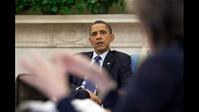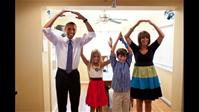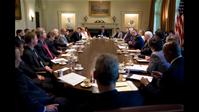About religion, politics, conflicts and Ground Zero
Adelina Marini, August 26, 2010
 The best way to understand a person is to read his book, is if he has any. The same goes for politicians too. The advertisement videos and election campaigns often present a politician exactly the way he is not, but rather the way people would like him. With books, however, things are different. Even if there is no personal story in the book, it could reveal the author'a way of thinking and to help readers explain later many of a politician's actions.
The best way to understand a person is to read his book, is if he has any. The same goes for politicians too. The advertisement videos and election campaigns often present a politician exactly the way he is not, but rather the way people would like him. With books, however, things are different. Even if there is no personal story in the book, it could reveal the author'a way of thinking and to help readers explain later many of a politician's actions.
This happened with the interference of president Barack Obama in the growing scandal, surrounding the plans for the construction of an Islamic Centre in Manhattan, near Ground Zero - the place where the two towers of the World Trade Centre were in New York, destroyed by airplanes, flown by terrorists on September 11, 2001. A little less than 4 thousand people died during the attacks. This event changed many things entirely - in politics and thinking and this is the reason why everything related to it is being perceived with painful sensitivity. Furthermore, 9/11 was a reason for the US's war in Afghanistan, the invasion of Iraq and for an overall change in the attitudes towards the world.
Is it because both wars are being led in countries with predominantly Muslim population or for other reasons, but obviously in people's mind a very clear link had been planted between Islam and terrorism. No matter that it is a long time tradition the White House to organise an Iftar dinner, with which the US President marks the celebration of Ramadan, thus demonstrating his respect for a religion. Barack Obama, however, made a clear distinction between the two in his statement during the Iftar dinner this year, when he for the first time interfered in the dispute between the supporters of the idea an Islamic centre to be built in Manhattan and its opponents.
What did Barack Obama say?
His short speech started with a recall of the background that led to the Act of Establishing Religion Freedom, in which Thomas Jefferson wrote that “all men shall be free to profess, and by argument to maintain, their opinions in matters of religion.” Then the American President went deeper into the conflict itself: "Recently, attention has been focused on the construction of mosques in certain communities -– particularly New York. Now, we must all recognize and respect the sensitivities surrounding the development of Lower Manhattan. The 9/11 attacks were a deeply traumatic event for our country. And the pain and the experience of suffering by those who lost loved ones is just unimaginable. So I understand the emotions that this issue engenders. And Ground Zero is, indeed, hallowed ground.
But let me be clear. As a citizen, and as President, I believe that Muslims have the same right to practice their religion as everyone else in this country. And that includes the right to build a place of worship and a community center on private property in Lower Manhattan, in accordance with local laws and ordinances. This is America. And our commitment to religious freedom must be unshakeable".
Barack Obama also explains that the reason for the 9/11 attacks was al Qaeda and not Islam. "In fact, al Qaeda has killed more Muslims than people of any other religion -– and that list of victims includes innocent Muslims who were killed on 9/11."
The book
In order to better understand Obama's thesis and the fact that it is not just a political but personal, also helps reading his book "Audacity of Hope". It is a very interesting reading, containing profound deliberations, part of which he now gradually realises as president. In his book Obama shares his thoughts quite sincerely, by refracting them through his own personal experiences and problems. A lot of pages are dedicated to his deliberations on religion in general. Obama distinguishes personal religious beliefs from "organised religion", as the latter falls under the influence of politics.
On these pages Mr Obama describes the religious attitudes in the environment he  grew up in - with a mother almost entirely an atheist, with a Muslim father, whom, however, he almost never saw during his childhood because when his parents divorced he was a little boy. Later, the relationship with the second husband of his mother - an Indonesian, also Muslim. He tells about a period of his life when he worked on his previous book in a Christian community in Chicago.
grew up in - with a mother almost entirely an atheist, with a Muslim father, whom, however, he almost never saw during his childhood because when his parents divorced he was a little boy. Later, the relationship with the second husband of his mother - an Indonesian, also Muslim. He tells about a period of his life when he worked on his previous book in a Christian community in Chicago.
"My experiences in Chicago also forced me to confront a dilemma that my mother never fully resolved in her own life: the fact that I had no community or shared traditions in which to ground my most deeply held beliefs. The Christians with whom I worked recognised themselves in me; they saw that I knew their Book and shared their values and sang their songs. But they sensed that a part of me remained removed, detached, an observer among them. I came to realise that without a vessel for my beliefs, without an unequivocal commitment to a particular community of faith, I would be consigned at some level to always remain apart, free in the way my mother was free, but also alone in the same ways she was ultimately alone".
Of course this quote I chose for you is put in the context of the much more detailed thoughts of Barack Obama about the religiousness of American society, about traditions, about values. Further on there is a gradual transfer of religious beliefs in politics, from where in the Senate. And a story from the election campaign for the Senate in Illinois, where the main opponent of Obama was Alan Keys. Regarding Barack Obama's position in support of the right for abortion, Keys attacks whenever possible Obama for saying that he is a Christian but is supporting a way of life, defined in the Bible as abomination; he also says that he is a Christian but supports the destruction of innocent and sacred life.
"What could I say? That a literal reading of the Bible was folly? That Mr Keys, a Roman Catholic, should disregard the Pope's teachings? Unwilling to go there, I answered with the usual liberal response in such debates - that we live in a pluralistic society, that I can't impose my religious views on another, that I was running to be a US senator from Illinois and not the minister of Illinois. But even as I answered, I was mindful of Mr Kyes's implicit accusation - that I remained steeped in doubt, that my faith was adulterated, that I was not a true Christian".
Precisely the deliberations, doubts, self-analysis and the analysis of social attitudes are behind the short speech of Barack Obama during the Iftar dinner in the White House in mid-August. "Indeed, over the course of our history, religion has flourished within our borders precisely because Americans have had the right to worship as they choose -– including the right to believe in no religion at all. And it is a testament to the wisdom of our Founders that America remains deeply religious -– a nation where the ability of peoples of different faiths to coexist peacefully and with mutual respect for one another stands in stark contrast to the religious conflict that persists elsewhere around the globe".
The reactions
I personally had no problem with Obama's statement, maybe exactly because I have read his thoughts on the issue. I also believe that no matter how reasonable a position might sound, if society's polarization is too steep, a reason would be lost. And here is the role of media, which should be able to overcome polarization and sift out what is important. And here we encounter a problem. Aside from political reactions, the way some columnists reacted in influential media provoked me to take Obama's book out on the bedside table again. My surprise was great because the fact that Obama's thesis is a result of his personal opinion, and not political, is the main criticism in David Ignatius commentary for the Washington Post.
 He agrees in principle with the president's thesis. But he says that the main mistake of the head of state is that he acts according to his beliefs instead of politically. A kind of paradox - not matter whether you are right and there is reason in what you say, you have to react politically whatever this might mean. "I think the president is right on the mosque issue (as on health care and his economic rescue efforts). But the larger point is that we truly have a leader who keeps doing the wise thing on policy (assuming you agree with him) but the dumb thing on politics", Ignatius writes.
He agrees in principle with the president's thesis. But he says that the main mistake of the head of state is that he acts according to his beliefs instead of politically. A kind of paradox - not matter whether you are right and there is reason in what you say, you have to react politically whatever this might mean. "I think the president is right on the mosque issue (as on health care and his economic rescue efforts). But the larger point is that we truly have a leader who keeps doing the wise thing on policy (assuming you agree with him) but the dumb thing on politics", Ignatius writes.
Later on the columnist points out that politicians often like to brag about how they aren't really political animals but public servants. It's almost a political cliche, to accompany a craven decision with the statement: "I'm not doing this to win votes, but because it's the right thing to do". But Obama is different. He truly doesn't seem to relish politics, in the raw, mix-it-up sense. Most of all, he isn't needy for public attention in the way our most neurotic and gifted politicians have been -- walking outpatients such as Richard Nixon or Lyndon Johnson or Bill Clinton. "He doesn't like red-hot; he likes cool and deliberative".
More than a stunning conclusion, given the rare political phenomenon Barack Obama who does precisely what he thinks because he believes that it is right and not because he might score more political points.
In a commentary in the Financial Times the columnist Clive Crook blames the president for not succeeding to express his thoughts in such a way to avoid provoking even bigger quarrel in society and also that his statement took the issue of the mosque in Manhattan on a national level. The author concludes his criticism like this: "Whether or not he made the case for the project to go ahead – as, on balance, I think he should – he could have reminded the country of its common purposes, he could have sought to unify, he could have insisted on tolerance and understanding on both sides. That was the Barack Obama the country elected. Where did he go?"
But I think that his statement is exactly this - a call for tolerance and an attempt for unification of the nation. And the reason the statement polarized the debate is precisely the clear position which, however, society is not prepared to accept. The question is what do people want - sincerity and honesty or well grinded politician who thinks one and does another? Here we cannot not mention Barack Obama's predecessor - George Bush Jr., who seemed a very religious man, which does not give a clear perspective how profound his faith is. No matter whether it is profound or is just for the cameras, the fact is that his policy led to a huge tension between Christians and Muslims, to the destruction of entire countries in which innocent Muslims hardly see not only a perspective for their own future but for their children too.
And a very important detail: is the demonstration of faith a justification of such political decisions? Isn't this a dangerous demagogy? Yes, it is true that it makes it easier to swallow the price of a war but is it fair toward the citizens? And don't they use such a justification to accept easily a war which otherwise they would not support if it is only based on political or economic grounds?
What were Bush's reasons to go to war is another question which is unlikely to  be answered because we know the man from media only. But if one day he would write a book, we would probably be able to explain what made him make one decision or another during his two terms as a United States president.
be answered because we know the man from media only. But if one day he would write a book, we would probably be able to explain what made him make one decision or another during his two terms as a United States president.
The question is whether societies are ripe enough to hear the truth from politicians. They expect clear positions no matter whether they are reasonable, right or not, but instead are voiced publicly "politically". When Obama says that the war is not against Islam and the terrorists are not an embodiment of Islam, he actually makes people reconsider a stereotype and this is the greatest provocation for mass conscience. And even bigger provocation is for us to realise that a politician could be right today instead of waiting for years to pass in order to tell ourselves "well, he was right but we rejected him because then, in that very moment, it was painful".